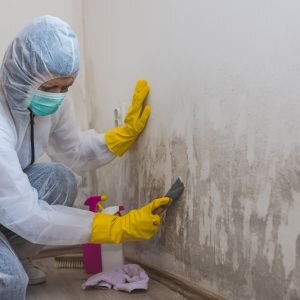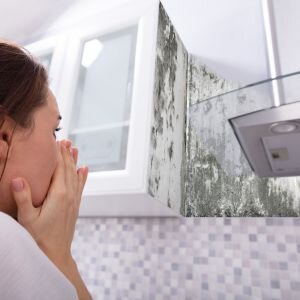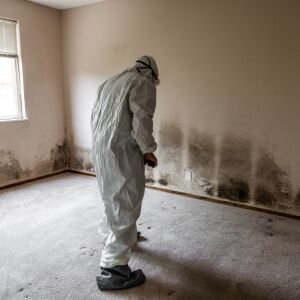
Common Types of Household Mold and Their Health Risks
If you want to sell a house in Philadelphia and think mold might be a problem, it helps to know what you’re dealing with. Mold is different, and some types are more dangerous than others, especially for your health.
S. chartarum, which is often just called “black mold,” is one of the best-known types. It usually shows up in places that have a lot of wetness, like bathrooms that don’t get enough air flow or basements that stay damp. It’s a problem because it makes mycotoxins, which can make people with allergies or weak immune systems sick by making them tired, giving them headaches, and irritating their skin.
Another type to watch for is Aspergillus. It’s fairly common indoors and, while it doesn’t look particularly alarming, it can cause allergic reactions and worsen asthma, particularly in children and older adults. Then there’s Cladosporium, which often pops up on fabrics, wood, or HVAC vents. It’s not as dangerous as black mold but can still lead to sinus problems, eye irritation, or skin rashes in sensitive individuals.
Not only does it give you peace of mind, but sellers are also paying more attention to what kinds of mold are present and how they can hurt your health. Dealing with these issues early on can make talks go more smoothly and help your home stand out in a crowded market like Philadelphia.
Understanding Mold Remediation in Real Estate Transactions
When it comes to selling a home with mold issues, remediation is not something to take lightly. Mold can affect more than just your home’s appearance, it can bring down its value and make buyers hesitant, especially in a competitive market like Philadelphia.
Mold removal is the process of finding the mold and getting rid of it, as well as the source of moisture that it needs. Most of the time, you shouldn’t try to do this yourself because cleanup companies have the skills and tools to do it right. They can figure out how bad the problem is, safely get rid of the mold, and give you advice on how to keep it from coming back.
After remediation, make sure you keep all the papers and records. Consumers and their representatives often request proof that the issue was properly fixed. In Pennsylvania, sellers are also required to tell buyers about any known environmental dangers. Having that paperwork on hand will protect you legally and encourage buyers to trust you.
Dealing with mold problems facing it head-on shows that you’ve taken care of your home properly. This is often even a selling point because it shows potential buyers that the house is safe and healthy.
Essential Steps to Remove Mold Before Listing Your Home
Before putting your home on the market, it’s smart to do a thorough check for mold, especially if you live in a city like Philadelphia where older homes and humid conditions can make mold more likely.
Start with an inspection of areas where mold tends to grow: basements, bathrooms, crawl spaces, and attics. If you see or smell anything suspicious, it’s best to bring in a certified mold remediation specialist. They’ll help determine how far the mold has spread and what needs to be done to remove it safely and thoroughly.
Not only do you have to get rid of the mold, you also have to fix the problem that made it grow. That could mean fixing leaks in the roof, filling in cracks in the floor, or making your ventilation better. The mold is likely to come back if you don’t fix the moisture problem.
After everything’s cleaned up, consider using a dehumidifier in damp-prone areas and sticking with a regular cleaning routine that includes anti-fungal products. These simple steps can help maintain a healthier indoor environment for showings and inspections.
Most importantly, write down everything you do. Keep the records, reports, and pictures of the work before and after it was done. This level of openness can help ease the buyer’s worries and give you more power in talks.
DIY vs. Professional: Best Practices for Removing Household Mold
When it comes to getting rid of mold, buyers often ask: Should I do it myself or hire someone to do it? The answer is based on how big and important the problem is.

Do-it-yourself ways can work well for small areas of surface mold, like in the shower corner or under the sink. Putting on safety gear, cleaning the area with a mold-killing liquid like hydrogen peroxide or vinegar, and then keeping it dry should usually get rid of it. It’s cheaper and faster to go this way.
But for bigger problems like mold on drywall, behind walls, or in HVAC systems, professional help is usually the safer bet. Certified mold remediation experts have the tools and know-how to remove mold at the source, not just on the surface. They’ll also check for moisture problems and help you prevent future growth, which is especially valuable in older Philadelphia homes.
In the real estate world, appearance matters but so does buyer confidence. A home that’s been professionally treated for mold (with the paperwork to prove it) can go a long way in reassuring buyers and moving the sale forward without surprises. The key is knowing when a DIY solution is enough and when it’s time to bring in the pros.
Hiring Professional Help: Choosing the Right Mold Inspector
If you can see mold or the property has had moisture issues in the past, it’s a good idea to hire a mold tester before you put it on the market. It’s best to hire someone who has worked in Philadelphia before because homes there are very different in age and condition.
Look for an inspector who is certified in mold assessment and familiar with the climate and building styles in the area. A qualified inspector can identify hidden mold issues and recommend the best course of action. Their report can also serve as solid documentation for buyers who want reassurance the problem was handled properly.
By investing in a trusted mold inspector early in the selling process, you’ll not only avoid surprises later, but also show buyers that you’re proactive and honest, which goes a long way in today’s market.
Navigating Home Inspections: Addressing Mold Concerns
Home inspections are a crucial part of any sale, and mold concerns can quickly derail a deal if not properly addressed. That’s why it pays to be proactive. Before listing, bring in a certified mold inspector to conduct a full evaluation and provide a written report.
If mold is found, have it remediated by professionals and keep all documentation. Older homes in Philadelphia are especially susceptible to hidden moisture issues, so addressing things like poor ventilation, roof leaks, or plumbing problems is key.
During showings or negotiations, transparency matters. Letting buyers know that mold issues have been resolved and providing proof of the work builds trust and can prevent last-minute deal breakers.
The Impact of Mold on Property Value and Sales Price
Mold doesn’t just impact health, it affects your bottom line. In Philadelphia, buyers are especially cautious about homes with any sign of mold, which can signal deeper issues like water intrusion or structural problems.
Even small mold problems can reduce your home’s value by 10% to 25%, depending on severity. Buyers may walk away or negotiate steep discounts. That’s why many realtors recommend resolving mold issues upfront and being transparent about it. Doing so can help you retain more value and speed up the sale process. Contact us if you have any questions.
Preparing Your Home for Sale: Handling Mold Problems
Before putting your home on the market, it’s essential to resolve mold issues and prepare your home for buyers. Start with a professional inspection, then tackle remediation as needed.
Once the mold is gone, address the root cause, this might involve improving drainage, fixing leaks, or adding ventilation. Disclose any previous mold issues and provide clear documentation. Doing this demonstrates transparency, which buyers appreciate and expect.
You can also make small upgrades like repainting or installing air purifiers to freshen up the space. In a market like Philadelphia’s, where buyers are detail-oriented, handling mold problems responsibly can give your home a competitive edge.
Effective Strategies for Selling a House with Mold Issues

Selling a house with mold doesn’t mean you’re out of luck, it just means you need a plan. In Philadelphia’s fast-moving real estate market, success starts with knowing the extent of the issue and tackling it early.
Start by hiring a certified mold specialist to assess and, if necessary, remediate the problem. Buyers are more likely to stay engaged when they see the issue has already been addressed. Be upfront about past mold and provide documents that show the work was done properly.
If the home still needs some updates, consider improvements that address moisture, like better ventilation or a new sump pump. These additions reassure buyers and can justify your asking price. Pricing the home with mold history in mind is also key. You might need to come in slightly under market or offer repair credits to keep interest high.
Another option: target investors or cash buyers who are more open to properties needing repairs. An experienced Philadelphia agent can help you tailor your marketing and pricing strategy based on buyer expectations and local competition.
How to Disclose Mold Issues to Potential Buyers Legally
In Pennsylvania, sellers are required to fill out a Seller’s Property Disclosure Statement and mold is part of it. If you know about mold issues, whether they’ve been remediated or not, you must disclose them.
The best way to handle this is with clarity and documentation. Provide a written record of inspections, photos of past damage (if available), and remediation reports. If mold has been completely addressed, that’s actually something buyers will appreciate they’d rather see the problem was fixed than left unspoken.
Failing to disclose known mold problems can backfire in a big way, leading to lawsuits, canceled deals, or worse. By being upfront, you protect yourself and build trust. In Philadelphia’s highly regulated market, legal transparency is not optional it’s essential.
Legal Considerations When Selling a Mold-Affected Property
Selling a home with mold requires more than just cleanup it involves legal responsibilities. Pennsylvania’s disclosure laws mean sellers are obligated to report any known mold issues, even if they’ve already been resolved.
It’s a smart move to have the property inspected before listing. That way, you’re prepared with facts, and you’re not relying on a buyer’s inspection to define the problem. If mold is discovered during a buyer’s inspection and wasn’t disclosed, the seller could face delays, renegotiations, or even legal action.
For added protection, many sellers consult with a real estate attorney, especially if the mold problem was serious or structural. In a complex housing market like Philadelphia’s, having legal guidance ensures you’re handling everything correctly and reducing post-sale liability.
Avoiding Lawsuits: Ensuring Proper Disclosure of Environmental Hazards
Mold isn’t just a health issue it’s a legal one. To avoid lawsuits, sellers need to be proactive with disclosures. That means documenting any environmental hazards, including mold, and being honest about the steps taken to address them.
A professional inspection helps set a clear baseline. From there, keep records of any remediation work and be ready to present them to potential buyers. Include this documentation with the seller disclosure to show you’ve done your due diligence.
This kind of transparency isn’t just about following the law it’s about minimizing risk and protecting your investment. In Philadelphia, where real estate transactions are often competitive and fast-paced, playing by the rules ensures fewer roadblocks and more confident buyers.
Negotiating Price Adjustments Due to Mold Damage in Homes

Mold can quickly shift the dynamics of a sale and that often shows up during negotiations. If a buyer discovers mold during inspection, expect them to ask for a price reduction or request a seller credit to cover remediation costs.
To stay ahead of the curve, it’s best to get your own inspection before listing. If you find mold, decide whether to fix it yourself or adjust the price accordingly. Buyers may be more open to a property if they understand the problem and see it’s been reflected in the price.
In Philadelphia’s market, being flexible and transparent can help you reach an agreement faster. If both sides understand the scope and cost of remediation, it’s easier to find a fair middle ground especially when time is of the essence. Nura Home Buyers can help if you have any questions.
Financing Options for Buyers of Homes with Past Mold Issues
Buyers interested in homes with past mold issues have options but lenders often require assurance that the problem has been properly resolved. In many cases, this means showing documentation of professional remediation and clean inspection results.
For buyers considering homes that still need work, FHA 203(k) loans or Fannie Mae’s HomeStyle Renovation loans can be a good fit. These allow buyers to finance both the purchase and necessary repairs, which can make mold-affected homes more accessible.
Some Philadelphia-area lenders or credit unions also offer renovation-specific loan programs. If your property has a mold history, highlighting these financing options in your listing or marketing materials can make a big difference, especially to first-time buyers who may be concerned about repair costs.
Marketing a Home with Previous Mold Problems Successfully
To market a home with a mold history, the key is honest storytelling. Buyers want to know that the issue has been handled so show them. Use before-and-after photos, detail the remediation process, and explain any improvements made, such as upgraded drainage or ventilation.
If you want to sell your house in Lancaster and nearby areas, invest in professional photography that showcases the property’s strengths while making sure problem areas look clean, bright, and well-maintained. Use your listing description to highlight the updates, and mention mold remediation clearly but confidently. Words like “fully remediated,” “professionally inspected,” and “documentation available” add reassurance.
In addition, it’s helpful to work with a realtor in Philadelphia who has experience selling homes like yours. They will know how to present your home in a way that will make serious buyers want to buy it, even if the past mold comes up.
Tips for Staging a House After Successful Mold Remediation
Fix up the damage and show off your home in its best light once the mold is gone. Do a good clean first to get rid of any smells that are still there. When you paint and decorate, use a basic color scheme. This gives the room a new, clean look that works for many people.
Highlight any upgrades made during remediation new floors, fresh drywall, or ventilation improvements. Open windows, use air purifiers, and keep the home well-ventilated for showings. If any areas were previously affected, make sure they’re visibly clean, dry, and presentable.
Putting in live plants or fresh flowers makes the air inside feel better and makes the house feel more welcome. It’s important to have personality when selling a home in Philadelphia. Don’t be shy about highlighting unique features like brick accents, built-ins, or the great location, but also reassure buyers that mold issues are a thing of the past.
Need to sell your house fast for cash in Philadelphia and easily? Nura Home Buyers offers fair cash offers, buys houses as-is, and takes care of all the details with no commissions or headaches. Call us today at (610) 550-8365 for a free, no-obligation offer.
Helpful Philadelphia Blog Articles
- Selling Your House As-Is In Philadelphia, PA
- Closing Costs When Selling A Home In Philadelphia, PA
- Sale Of Your Philadelphia, PA, Home Amid Divorce Proceedings
- Selling Your Philadelphia, PA, Home Without A Real Estate Agent
- Selling A Foreclosed Home In Philadelphia, PA
- Selling A Probate House In Philadelphia, PA
- Sell Your Philadelphia, PA, Home Needing Repairs Without Renovation
- Is Philadelphia, PA, Safe
- Philadelphia, PA, Neighborhood Map
- Free Things to do in Philadelphia, PA
- Best Property Managers in Philadelphia, PA
- Philadelphia, PA, Cost of Living

| MOLD INFESTATIONS | PHILADELPHIA, PA. | REALTORS | HOMEBUYER | MILDEW | SPORES |
| INSURANCE | DRYWALL | MONEY | BANKRUPTCY | SMELL | |
| MOLD SPORES | HVAC SYSTEMS | HEALTH HAZARD | FLOODING | CRAWL SPACES | BLEACH |
| THE UNITED STATES | SPECIES | ROOT | RESPIRATORY SYMPTOMS | RESPIRATORY DISEASE | VALUATION |
| NATIONAL ASSOCIATION OF REALTORS | NAR | SUING | HOMELIGHT | FUNGI | FULL DISCLOSURE |
| BUYER BEWARE | CAVEAT EMPTOR | BLOG | ALLERGIES | TYPES OF MOLD | WE BUY HOUSES |
| HOUSE WITH MOLD CAN | TO SELL YOUR HOUSE | CAN SELL A HOUSE | MOLD IN YOUR HOME | A HOME WITH MOLD |
